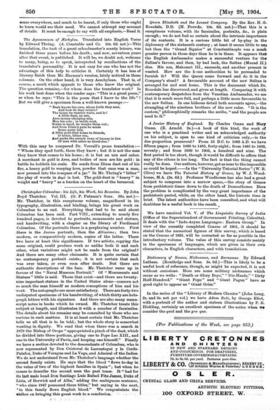The Agamemnon of yEschylus. Translated into English Verse by Edward
Thring. (A. Constable and Co. 10s. 6d. net.)—This translation, the task of a great schoolmaster's scanty leisure, was finished three years before his death ; and now, seventeen years after that event, is published. It will be, we doubt not, welcome to many, being, so to speak, interpreted by recollections of the translator's personality. It is not easy for one who has not the advantage of this help to criticise it. Certainly it has less of literary finish than Mr. Harman's version, lately noticed in these columns. On the other hand, it is very Aeschylean. That is, of course, a merit which appeals to those who know the original. The question remains,—for whom does the translator work ? Is his work best done when the reader says: "This is a great poem," or when he says : "This is the poem that I know to the life" ? But we will give a specimen from a well-known passage :— "Each knows his own, whom forth they sent,
And how do they return P The home its warrior waits, and lo I A little dust, an urn.
Ares money-changing sits, Men his coin ; in battle rout, Scales in hand, he weighs them out ; And from Ilium's pyre he sends Some sorry bits, A little gold-dust home to friends, 0 bitter, bitter rue, And packs the seemly rows of bronze in lieu Of men with ashes as blood-due."
With this may be compared Dr. Verrall's prose translation :— " Whom they sped forth, them they know ; but it is not the man they know that comes to his home ; it is but an urn and ashes. A merchant in gold is Ares, and bodies of men are his gold : in battle he holdeth his scale. He sends from Ilium dust out of his fire, a heavy gold to weeping love, powder that once was a man, now pressed into the compass of a jar." In Mr. Thring's "bitter" the play of words in gam', is lost. The gold-dust is " heavy " in weight and " heavy " as a burden on the heart of the bereaved.






































 Previous page
Previous page